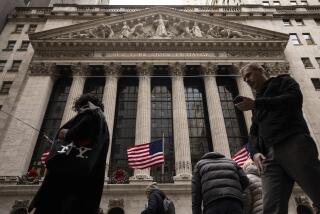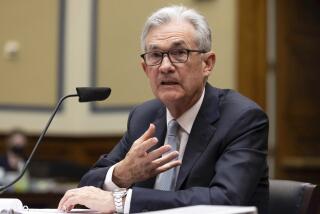Slump Expected to Be Mild, Congress Told : No Way to Avoid Recession, Economists Say
- Share via
WASHINGTON — Top economists offered Congress a pessimistic assessment Friday that there was little government could do to avert a recession in the next couple of years, but the analysts said the downturn was likely to be mild.
While the predominant belief was that the United States would avoid a recession during this presidential election year, many of the private economists said a downturn was growing increasingly likely in 1989 or 1990.
The analysts appeared before the Joint Economic Committee of Congress as it conducted hearings into the country’s economic prospects following last year’s turmoil in financial markets.
Allen Sinai, chief economist for Boston Co., a unit of Shearson Lehman Bros., said the current expansion has lasted a peacetime record of 61 months and was growing increasingly vulnerable.
“The best prospect is that the U.S. economy can expand for yet another year, although not without considerable risks,” Sinai said. “Huge (debt) imbalances are calling the tune on a winding down of the current business expansion toward the next recession.”
Sinai said he was forecasting that the economy, as measured by gross national product, would expand at a pace of between 2% and 2.5% this year, down from 3.5% in 1987.
Irwin Kellner, chief economist of Manufacturers Hanover, was the only economist to testify during two days of hearings who forecast a recession starting this year.
Kellner predicted that the downturn will begin in early 1988 and last the entire year, a forecast not likely to be greeted with enthusiasm by Republicans hoping to hold on to the White House.
He said autos and housing, two key sectors of the economy, are already in decline and that hoped-for strength in business investment spending and U.S. export sales would not be enough to offset a slump in consumer demand.
Kellner said there has been only one time in this century when a drop in the stock market of the magnitude that occurred this past fall--a decline of 36% from mid-August to mid-October--did not trigger a recession.
Kellner said a 40% drop in stock prices during World War II did not bring on a recession because the war buildup was enough to offset the effects from the decline.
But Kellner said he was not looking for a recession anywhere as severe as the one that followed the 1929 stock market crash.
Kellner and several of the other economists said they did not think there was much the government could do to avert a downturn.
Nariman Behravesh, senior vice president at the WEFA Group, formerly Wharton Econometrics, said the string of high federal budget deficits effectively blocked further expansionary moves on the part of the federal government.
More to Read
Get the L.A. Times Politics newsletter
Deeply reported insights into legislation, politics and policy from Sacramento, Washington and beyond. In your inbox twice per week.
You may occasionally receive promotional content from the Los Angeles Times.










